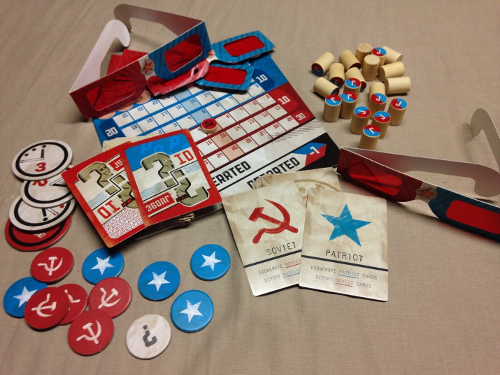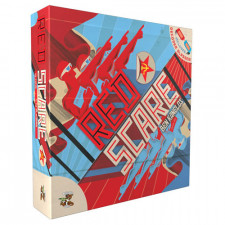Red Scare Review
on Oct 11, 2017
Critical Hits: Fun, gimmicky social game with a great hook.
Critical Misses: Lying and dishonesty can be de-incentivized, which impacts the fun.
I know about the Red Scare. As a dedicated viewer of FX's television drama The Americans, you could almost call me an expert. This puts me in the perfect position to take a long and suspicious gander at Pandasaurus Games' new social deduction offering. Should we deport this heathen or clear its name? Well, the answer's as complicated as McCarthyism and the swirling geo-political conflict of the 1950s.
Designs are only as good as their hook and Red Scare's hook is pretty sharp. Half the player's at the table wear special red-tinted decoder glasses while the other half mock them for poor fashion sense. Throughout play you will manipulate your hand of three citizen cards and attempt to identify which are soviets and which are patriots. Half the cards can be identified by those sporting the cool as hell eye-wear and the rest only by those lacking such sophisticated paraphernalia. It's a clever and enticing concept that simply works.
There are a couple of gotchas (as should be expected with any Soviet-era technology). Those wearing the glasses will need to pay precise focus on an area of the card that can be difficult to decipher. You're looking for the word "SOVIET" or "PATRIOT" amid a number of characters, including partials of those two monikers. It can take a couple of seconds to clearly ID the culprits and those with poor eye sight may struggle to get a handle on it at times.

I always knew you were a Patroviet.
For the most part, the cardboard spectacles do their job and segment information between the two groups effectively. Plus, c'mon, they're just fun. You feel like you're attending an underground punk show in the 80's sporting your now retired jean jacket, or maybe just chilling on a hoverboard with Emmett Brown in 2017.
Players are dealt face-down cards and split into two equal teams of Soviets and patriots. You know where your misplaced allegiance lies but not those of the other scoundrels surrounding the table. Shady discussion breaks out and Emily hasn't even taken the first turn before you've called Jim's mom a pinko commie dog.
The goal here is exonerate your own citizen cards and deport the other side's. The trick is that you can only perform the judgment action on cards that you can't visually identify. This means you need to communicate with a player that can read the status of the cards and then you need to trade these citizens around the table attempting to organize the helpless plebes until you can slam the gavel and deliver the sentence.
This is immediately clever because it presents a sense of co-dependency. You're relying on information offered by another player and need to filter that appropriately to decide whether to ruin that little faceless cardboard life in your sweaty palm. When you judge citizens you also proclaim the effect for the entire group of three cards in your hand. This provides logistical challenge and fuels more nuanced trade schemes across the board.

It certainly has style.
While there's a lot of style and smooth appeal with this design, there are a couple of structural issues that threaten to blacklist it.
The problem is that social deduction games in general rely on people spreading misinformation. This increases the enjoyment and forms a central puzzle to needle through. Red Scare unfortunately struggles to provide an incentive to lie.
Now, there are times when a sly misdirection can result in a solid amount of points. If Aaron asks to identify his hand and I convince him to exonerate a bunch of Soviets, hurting his own team, fantastic. This feels great and it's what I want out of this design as everyone is closely huddled around the table and trying to read each other's poker faces.
More often than not, however, you have a group of players being completely honest. If you can find a teammate or two and perhaps rely on cross-corroboration to validate cards before they are passed, you can undermine the entire experience. By openly stating your affiliation and working with a collective you can quickly pile on the points. Those players choosing to lie and obfuscate reality may cause some difficulties for the opposition, but they can quickly be outed by another player if the group requires cards be validated through multiple hands. By targeting the opposition you're also sacrificing actions in the game which are likely better spent helping your own teammates exonerate or deport those pesky citizens.
When truth becomes the norm then the game shifts to a dynamic of whoever draws better wins. It also undermines the end game mechanism of identifying each player's allegiance with the Accuse system. Once honesty reigns supreme whoever shouts Accuse! first at the appropriate time will lock-in the extra points.
The good news is that Red Scare's weaknesses are minimized with larger player counts, and completely filtered out with the fantastic real-time variant in the back of the rulebook. Yeah, a social deduction game you can play sans turns.
Real-time works exactly the same except you can take actions whenever you want, even while other players are passing cards or shouting above the din. This method of play still desires a larger number of participants to ensure chaos and distraction as it helps to alleviate any air of clarity in discussion. As people strain their vocal chords and act with furious speed you're pressured into making quicker deductions and relying on imperfect options. It feels right and the game's layers can more aptly breathe.
The challenge with this title is that it's difficult to envision the turn-based mode as a serious challenger to the genre's stalwarts. The real-time mode, however, does offer a completely unique experience that you're not going to find elsewhere. It's chaotic and empowering as the group devolves into verbal slandering and knee-jerk McCarthyism. Whether the game earns its playtime or simply exists as an expensive set of red-tint glasses is ultimately up to how you engage it.

 Customer Support
Customer Support  Subscribe
Subscribe 




 Account
Account  Wishlist
Wishlist 

